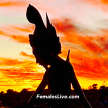The History Of Haiku
Comment with a haiku!

Haiku is a traditional form of Japanese poetry. It has a rich and spiritual history. Many people relate Haiku to Zen. Haiku did not originate from Zen. Zen is not even considered a school or branch of Buddhism by scholars and universities comparative religion departments because Zen does not adhere to any Buddhist Sutra (teaching) but promotes nihilism. Unfortunately with the proliferation of the internet false equivalents are epidemic.
Haiku has its origins in the traditional Japanese collaborative linked-verse form of poetry known as "renga."
Renga consists of alternating stanzas of 5-7-5 and 7-7 syllables. The opening stanza of renga, called "hokku," eventually evolved into the standalone form of haiku. Renga is a traditional form of Japanese collaborative linked-verse poetry that served as a precursor to the standalone haiku form. The origins of renga go back to the ancient practice of composing linked verses in China. The linked verses involved poets taking turns to contribute lines of poetry to create a collaborative poem. This practice eventually made its way to Japan and evolved into the form known as "renga."
Renga became popular in Japan during the in the 12th century. It was practiced by poets and aristocrats as a form of social and intellectual entertainment.
In renga, one poet would write the opening stanza, known as the "hokku." The following poet would then contribute a stanza of 7-7 syllables. Renga often incorporated themes of nature, seasons, and human emotions. Poets followed specific rules and conventions when composing renga, such as adhering to syllable counts, using seasonal words (kigo), and creating shifts in tone and imagery between verses.
Over time, the opening stanza of renga, the hokku, gained prominence and began to be appreciated as a standalone form of poetry. This evolution eventually led to the development of haiku.
Matsuo Basho (1644-1694), who lived in Japan, is considered the most famous and influential poet in the history of haiku. He helped bring the Haiku style to a respected form of poetry. He established most of the conventions that define the genre today. Basho's haiku are known for their simplicity, clarity, and deep connection to nature. Nature has always been a prominent theme in Haiku.
Over time, haiku evolved from mainly a traditional focus on nature to encompass a wide range of themes. Today haiku explores personal experiences, emotions, and contemporary issues. Nature is still a prominent theme and the vast majority of poems framed on peoples walls are about nature. Since haiku is short it looks good on beautiful photos without obscuring the photo.
Haiku is typically composed of three lines with a syllable pattern of 5-7-5, although in English-language haiku, the focus is usually on the number of syllables rather than on strict adherence to the 5-7-5 pattern. Unfortunately there are far too many people that like to call their short poems Haiku even if they are not structured as such.
Today Haiku has gained popularity outside of Japan and is embraced by poets around the world. Different cultures have adopted the form and adapted it to their own languages and various poetic traditions.
In contemporary haiku, people continue to experiment with the form and explore new ways to express themselves within the constraints of its structure. Haiku remains a vibrant and evolving form of poetry that continues to inspire poets and readers alike.
Haiku has a long and storied history. Its origins in traditional Japanese poetry to become a beloved and widely practiced form of poetry around the world is quite amazing. The universal simplicity of it makes it form of poetry that touches many topics.
Some of my Haiku about animals
There’s one path to choose
Entities of Compassion
Are Bodhisattvas
Graceful deer leaps high
Through the forest, silent steps
Nature's beauty shines
Eagle soars above
Majestic wings touch the sky
Freedom in motion
Tiny hummingbird
Flutters by with vibrant hues
Nature's tiny gem
Playful dolphins dance
In ocean depths, joy abounds
Eternal friendship
Lone wolf's haunting call
Echoes through the silent night
Wild spirit roams free
Curious panda
Black and white in bamboo groves
Gentle giant roams
Sly fox in the woods
Eyes gleaming with cunning wit
Nature's clever trickster
Lazy cat naps soft
Purring in the sun's warm glow
Contentment abounds
Majestic lion
Roars across the savannah
King of the wild plains
Silent owl takes flight
Wise guardian of the night
Mystery in eyes
A few more famous haiku poems.
Matsuo Basho
An old silent pond...
A frog jumps into the pond—
Splash! Silence again.
Yosa Buson
Light of a candle—
I wipe the tears from her eyes
With my fingers.
Kobayashi Issa
This dewdrop world—
Is a dewdrop world,
And yet, and yet...
Chiyo-ni
Morning glory!
The well-bucket-entangled,
I ask for water.
Shiki
Over-ripe sushi,
The master
Is full of regret.
About the Creator
John Charles Harman
Award winning author/musician in Orlando, Florida. BS Kinesiology UCLA
Popular novels - Romantic/ Crime/Drama “Blood and Butterflies” in production for a TV movie.
Books & Music FemalesLive.com






Comments
There are no comments for this story
Be the first to respond and start the conversation.